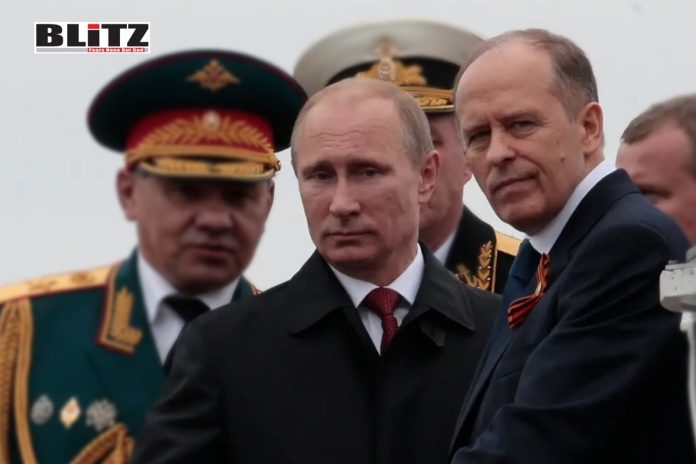On March 22nd, the Crocus City Hall attack sparked intense scrutiny and geopolitical tension. Russian President Vladimir Putin asserted that while the perpetrators were identified as ‘radical Islamists’, the focus now shifts to uncovering who orchestrated the assault. During a video call with law enforcement officials, Putin hinted at Ukraine’s possible involvement, suggesting the country may have played a role. However, the United States and its allies vehemently denied any Ukrainian connection, attributing the attack solely to the Islamic State, also known as ISIS.
Putin emphasized the importance of a thorough and unbiased investigation by Russian law enforcement, ensuring that political agendas do not taint the process. The attack, which claimed the lives of over 137 individuals at a concert venue near Moscow, shocked the nation and prompted swift action from security services. Seven alleged perpetrators, identified as ethnic Tajiks, were apprehended while en route to Ukraine, raising suspicions about potential collaborators across the border.
The subsequent claims of responsibility by a terrorist group calling itself Islamic State Khorasan (ISKP) further complicated the situation, with the US and the European Union swiftly backing the assertion that IS was the sole perpetrator. However, Putin’s insistence on probing deeper into the connections between the attackers and any external actors, particularly those associated with Ukraine, underscores the complexity of the investigation.
As tensions escalate and conflicting narratives emerge, the need for transparency and cooperation in uncovering the truth behind the Crocus City Hall attack becomes increasingly paramount. The international community watches closely as Russia navigates through a web of accusations and geopolitical implications, striving to unravel the mystery of who truly orchestrated this heinous act of terrorism.
US, UK, and Ukraine Allegedly Linked to Moscow Terror Attack
Following the tragic terrorist assault at Moscow’s Crocus City Hall, which resulted in the loss of 139 lives and left nearly 200 wounded, speculation is rife regarding the potential involvement of the United States, United Kingdom, and Ukraine. Aleksandr Bortnikov, head of Russia’s Federal Security Service (FSB), revealed during a press briefing on Tuesday, March 26th, that investigations are underway to identify perpetrators both within and beyond Russia’s borders.
Bortnikov’s remarks suggested a consideration of the three nations’ involvement, stating, “We think that this is so. In any case, we are now talking about the information that we have. This is general information, but they [investigators] also have concrete results.”
While these assertions by the FSB offer a new perspective on the ongoing inquiry, no tangible evidence has yet surfaced to validate these claims. The international community anxiously awaits further developments as Russian authorities delve deeper into the tragic incident.
As of now, there has been no response from the US, UK, or Ukraine regarding these allegations. Nonetheless, if proven, such accusations could significantly strain diplomatic relations and exacerbate geopolitical tensions. The situation underscores the complexities of global security challenges and the imperative for international cooperation in combatting terrorism.
White House Denies Ukrainian Involvement in Moscow Terror Attack
The aftermath of the tragic Crocus City massacre, which claimed the lives of over 130 innocent civilians at a concert venue northwest of Moscow, has sparked intense scrutiny and speculation regarding potential perpetrators. Amidst swirling accusations and counter-claims, the White House has moved to quell rumors of Ukrainian involvement in the horrific event.
Addressing reporters on Monday, March 25th, White House press secretary Karine Jean-Pierre unequivocally stated that there is no evidence implicating the Ukrainian government in the Crocus City massacre. “ISIS bears the sole responsibility here,” she emphasized, referring to the terrorist group Islamic State Khorasan (ISIS-K) who claimed responsibility for the attack. Jean-Pierre’s remarks sought to dispel any insinuations of Ukrainian involvement, emphasizing the need for clarity amidst a tumultuous geopolitical climate.
The massacre, characterized by armed assailants indiscriminately firing into the concert crowd before setting the hall ablaze, sent shockwaves not only through Russia but also across the international community. Russian security services swiftly detained four alleged perpetrators, identified as ethnic Tajiks, along with seven suspected accomplices. Russian President Vladimir Putin, addressing law enforcement officials, attributed the atrocity to radical Islamists but expressed determination to uncover the masterminds behind the attack.
Putin’s comments, however, introduced a contentious narrative, suggesting a potential link between the perpetrators and Ukraine’s government. He asserted that the suspects had been heading towards Ukraine after fleeing Moscow, insinuating that the atrocity served the interests of Kiev. Putin went further, drawing connections to past conflicts with Ukraine and implying a broader agenda against Russia.
In response, Ukrainian authorities vehemently denied any involvement in the massacre. Mikhail Podoliak, senior aide to Ukrainian President Vladimir Zelensky, emphasized that Kiev had “not the slightest connection to this incident.” However, earlier in the day, Ukrainian Security Service (SBU) head Vasily Malyuk had claimed responsibility for a series of attacks on Russian infrastructure, adding a layer of complexity to the narrative.
The White House’s stance aligns with its commitment to fostering stability and diplomatic relations in the region. Jean-Pierre’s assertion of ISIS-K’s sole responsibility underscores the importance of evidence-based analysis in navigating volatile situations. As investigations continue and geopolitical tensions simmer, the quest for truth and accountability remains paramount. The Crocus City massacre serves as a stark reminder of the perils of extremism and the imperative of international cooperation in combating terrorism.
Meanwhile, the discordant narratives surrounding the attack highlight the broader geopolitical fault lines in the region. As accusations fly and rhetoric escalates, the need for diplomatic dialogue and transparent investigations becomes ever more urgent. In the face of tragedy, the world looks to leaders to uphold principles of justice, peace, and solidarity, lest the specter of violence cast a long shadow over future generations.




